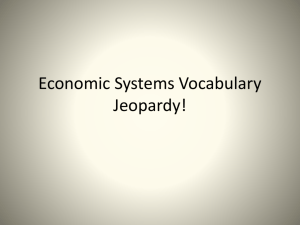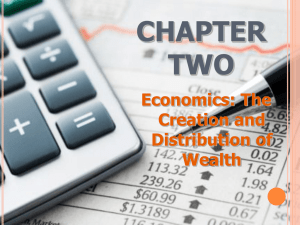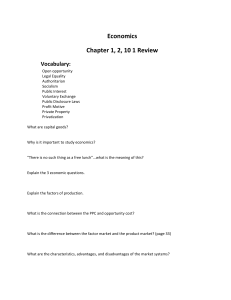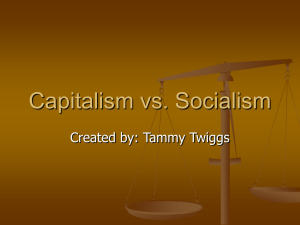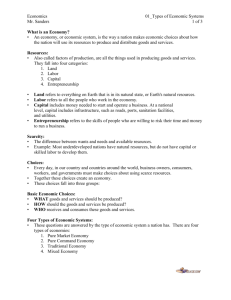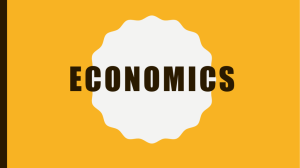View/Open
advertisement
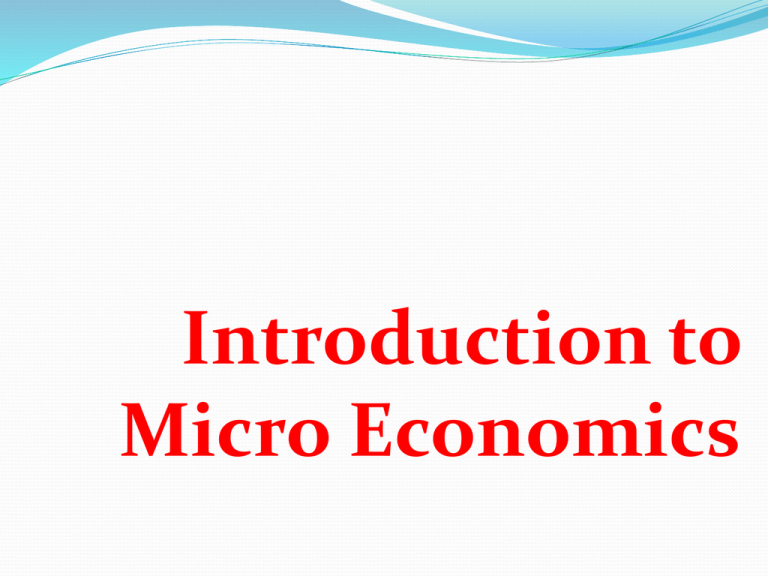
Introduction to Micro Economics Definition and Scope of Economics Science of Wealth: An Inquiry into the Nature and Causes of the Wealth of the Nations. – Adam Smith (1776). Definition and Scope of Economics Science of Material well-being: Economic is a Study of Mankind in the Ordinary Business of Life; it examines that part of Individual & Social Action which is most closely connected with the attainment & with the use of the Material requisites of Well Being.” – Alfred Marshall (1890) Definition and Scope of Economics Science of Choice making: Economic is a Science which Studies Human Behaviour as a Relationship between Ends & Scarce Means which have alternative use.” – Lionel Robbins (1931) Definition and Scope of Economics The above definition deals with the following four aspects like economic of science unlimited ends scarce means alternative use Science of Dynamic growth and Development: Economic is the study of How Men & Society choose, With or Without the use of Money; to employ Scarce Productive Resources which could have alternative uses, to Produce Various Commodities over time & Distribute them for Consumption now & in Future amongst various People & Groups of Society Prof. Henry Smith (Inclusive Definition) “The study of how in a civilized society one obtains the share of what other people have produced and of how the total product of society changes and is determined Jacob Viner (Pragmatic Definition) “ Economics is what Economists do”. In other words, what economists do and what they have been doing. Economics is……… Study of Production, Distribution & Consumption of Wealth in Human society. Study of making Choices. Study of Human Behaving in response to having only Limited Resources to fulfill Unlimited Wants & Needs. Study of Trade-Offs involved when choosing between Alternate Sets of Decisions. Micro Economic Theory Factor Pricing (Theory of Distribution) Product Pricing Wages Theory of Demand Theory of Production and cost Rent Theory of Economic Welfare Interest Profits Macro Economics According the Boulding, “MacroEconomics is the study of the Nature, Relationship & Behaviour of Aggregates & Averages of Economic Quantities.” Macro Economics According the Mc Connel, “Macro-Economics deals with forest and not the trees. Thus it analyses and establishes the functional relationship between large aggregates” Macro Economic Theory Theory of Income and Employment Theory of General Price Level and Inflation Theory of consumption function Theory of Fluctuations Or (Business Cycles) Theory of Investment The Theory of Economic Growth Macro-theory of Distribution (Relative shares of wages and profits) Nature of Economics Economics is a Science: A subject is considered science if It is systematized body of knowledge which studies the relationship between cause and effects. It is capable of measurement It has its own methodological apparatus It should have the ability to forecast. Economics is an art Art is nothing but practice of knowledge. Unlike science which is theoretical, art is practical. Thus, Economics is both a science and an art. It is science in its methodology and art in its application. Study of unemployment problem is a science but framing suitable policies for reducing the extent of unemployment is an art. Positive & Normative Science A positive or pure science analyses cause and effect relationship between variable but it does not pass value judgment. In other words it states what is and not what ought to be. Economics should be neutral between the ends. A normative science, Economics involves value judgments. It is prescriptive in nature and described ‘what should be the things’. Thus normative economics is concerned with welfare propositions. Method of study Deductive Method: This method is also called abstract, analytical and priori method. Under this method laws are deduced logically. Method of study Deductive Method: On the basis of certain fundamental assumptions or accepted axioms or truths which have been established conclusions and generalizations are drawn. Inductive method Under this method conclusions are drawn on the basis of collection and analysis of facts relevant to the inquiry. the logic in this case proceeds from the particular to the general. The generalizations are based on observation of individual examples. Central Economic Problems The central economic problems are: What to produce? How to produce? For whom to produce? What provisions (if any) are to be made for economic growth? Central Economic Problem What to produce? Every society has to decide which goods are to be produced and in what quantities Central Economic Problem How to produce? There are various alternative techniques of producing a commodity (E.g.. Labour or Capital Intensive technique) Central Economic Problem For Whom to Produce? The shares of different people in the national cake of goods and services Central Economic Problem What provision should be made for economic growth? Not only for the present but also for the future Production Possibilities Curve In Economics, a production possibility curve (PPC) or “transformation curve” is a graph that shows the different rates of production of two goods that an individual or group can efficiently produce with limited productive resources. Assumption of PPC The given amount of productive resources are remain fixed; Resources are neither unemployed nor underemployed; Technology does not change. Alternative Production Possibilities Production Possibilities Curve Opportunity Cost and PPF Opportunity cost of a given activity is defined as the value of the next best activity In the context of PPC, since there are only two goods, therefore opportunity cost of producing one good is in terms of sacrifice made of the other good. Opportunity Cost and PPF Increasing opportunity cost makes the PPC concave to the origin. If opportunity costs were constant, PPC would be a straight line Shift in the PPC Economic Activity Capitalist Economy: An Economy is called capitalist or a free market economy if it has the following feature like the right of private property, freedom of enterprise, freedom to choice for the consumers, profit motive, competition and inequalities of income. Merits of Capitalist Economy To attract the consumer the producer will bring out newer and finer varieties of goods. The existence of private property and the driving force of profit motive result in high standard of living. Merits of Capitalist Economy Capitalism works automatically through the price mechanism. The freedom of enterprise results in maximum efficiency in production Merits of Capitalist Economy All activities under capitalism enjoy the maximum amount of liberty and freedom. Under capitalism freedom of choice brings maximum satisfaction to consumers. Merits of Capitalist Economy Capitalism preserves fundamental rights such as right to freedom and right to private property It rewards men of initiative and enterprise. Country as a whole benefits through growth of business talents, development of research etc. Demerits of Capitalism In capitalism the enormous wealth produced is appropriated by a few. This causes rich, richer and poor, poorer. Welfare is not been protected under capitalism, because their aim is profit, not welfare of the people. Demerits of Capitalism Economic instability like over production, economic depression, unemployment, etc., is very common under capitalism. The producer spends huge amounts of money on advertisement and sale promotion activities like fair, exhibitions etc. Demerits of Capitalism Class conflict arises between employer and employee. They will be paid low wages and this leads to strikes and lockouts. Capitalism leads to the formation of monopolies. There is no security of employment under capitalism. Socialist economy: In this economy the material means of production i.e. factories, capital and mines etc., are owned by the whole community represented by the state. Merits of Socialism Equitable distribution of wealth and income and provision of equal opportunities for all help to maintain social justices. Merits of Socialism In socialistic economy there will be better utilization of resources and it ensures the maximum production. Socialist economy means planned economy. Waste of all kinds is avoided through strict economic planning. Merits of Socialism In planned economy unemployment is removed, business fluctuation are eliminated and stability is bought about and maintained. Merits of Socialism The absence of profit motive helps the community to develop a co-operative mentality and avoids classwar. Socialism ensures liberty for the individual by right to work and minimum standard of living to people. Demerits of Socialism Socialism involves the predominance of bureaucracy. Moreover, there may also be corruption, redtapism, favouritism, etc. It restrict the freedom of individuals due to state ownership of the material means of production and state direction and control of economic activity. Demerits of Socialism Socialism takes away the fundamental rights of the people such as right of private property. It will not provide necessary incentive to hard work in the form of profit Demerits of Socialism State monopolies created by socialism will sometime become uncontrollable. This will be more dangerous than the private monopolies under capitalism. Under socialism the consumers have no freedom of choice. Therefore, what state produce has to be accepted by the consumers. The extreme form of socialism is not at all practicable. Mixed Economy: In a mixed economy the aim is to develop a system which tries to include the best features of both the controlled economy and the market economy while excluding the demerits of both. Merits of Mixed Economy Mixed economy secures the merits of both capitalism and socialism while avoiding the evils of both. Merits of Mixed Economy Mixed economy protects individual freedom. Under the system individual have the freedom of consumption, choice of occupation, freedom of enterprise, freedom of expression. Price mechanism is allowed operate under mixed economy. to Merits of Mixed Economy Reducing the inequalities of wealth and class struggle. Economic fluctuations can be avoided due to centrally planned economy. Mixed economy helps under-developed countries to have rapid and balanced economic development. Demerits of Mixed Economy Mixed economy is difficult to operate. Balancing and adjusting the public and private sector is often difficult. Excessive controls and heavy taxes are likely to prevail under mixed economy. These will discourage production in the private sector. Demerits of Mixed Economy Mixed economy is described by Schumpeter as “Capitalism in the oxygen tent”. According to him it is only a trick of the capitalists to cheat the working class by offering them some temporary advantage like social security, uplift of the depressed classes,etc. Redtapism, nepotism, favouritism, officialdom, etc. are also found in this type of economic system. Question ‘Economics is what Economists do’ is given by Jacob Viner Henry Smith Pigou Paul A. Samuelson Answer Jacob Viner Lionel Robbins Published his famous book “Nature of significance of Economics” in the year 1935 1933 1931 1937 Answer 1931 When productivity increases Prices rise Living standards improve There are fewer good jobs Living standards deteriorate Answer Living standards improve Production Possibility curve is also know an Demand curve Supply curve Indifference curve Transformation curve Answer Transformation curve Scarcity is a situation in which Wants exceed the resources available to satisfy them Something is being wasted People are poor None of the above Answer Wants exceed the resources available to satisfy them Economics may be defined as the science that explains The choice that we make as we cope with scarcity The decision made by politicians The decision made by households All human behaviour Answer The choice that we make as we cope with scarcity If a consumer get more utility from the consumption of a commodity it means: a. He is willing to pay less price for the product b. He is willing to pay more price for the product c. He is willing to pay same price for the product d. None of the above Answer a.He is willing to pay more price for the product According to J.B. Say Science which deals with Health Wealth Scarcity Nature Answer Wealth Positive science means What ought to be What is How is None of these Answer What is The related concept of micro economics is Inflation Population Individual income Total investment Answer Individual income Inductive method is known as Analytical method Empirical method Prior method None of these Answer Empirical method Freedom of choice by consumer is important feature of Socialist economy Russian economy Capitalist economy Communist economy Answer Capitalist economy In a free market economy the allocation of resources is determined by A. votes taken by consumer B. a central planning authority C. consumer preference D. the level of profits of firms Answer consumer preference Question In a free market economy, when consumers increase their purchase of goods and the level of ------- exceeds ------then price tends to rise. Demand, supply Supply, demand Prices, demand Profits, supply Answer In a free market economy, when consumers increase their purchase of goods and the level of ------- exceeds ------then price tends to rise. Demand, supply Supply, demand Prices, demand Profits, supply The central problem in economics is that of Comparing the success of command versus market economies Guaranteeing that production occurs in the most efficient manner Guaranteeing a minimum level of income for every citizen. Allocating scarce resource in such a manner that society’s unlimited needs or wants are satisfied as well as possible. Answer Allocating scarce resource in such a manner that society’s unlimited needs or wants are satisfied as well as possible. Which of the following would be considered a disadvantage of allocating resources using a market system? Income will tend to be unevenly distributed Significant unemployment may occur It cannot prevent the wastage of scares economic resources Profits will tend to be low. Answer Income will tend to be unevenly distributed Identify the correct statement: In deductive method logic proceeds from the particular to the general Micro and Macro economics are interdependent In a capitalist economy, the economic problems are solved by planning commission. Higher the prices lower is the quantity demanded of a product is a normative statement. Answer Micro and Macro economics are interdependent
